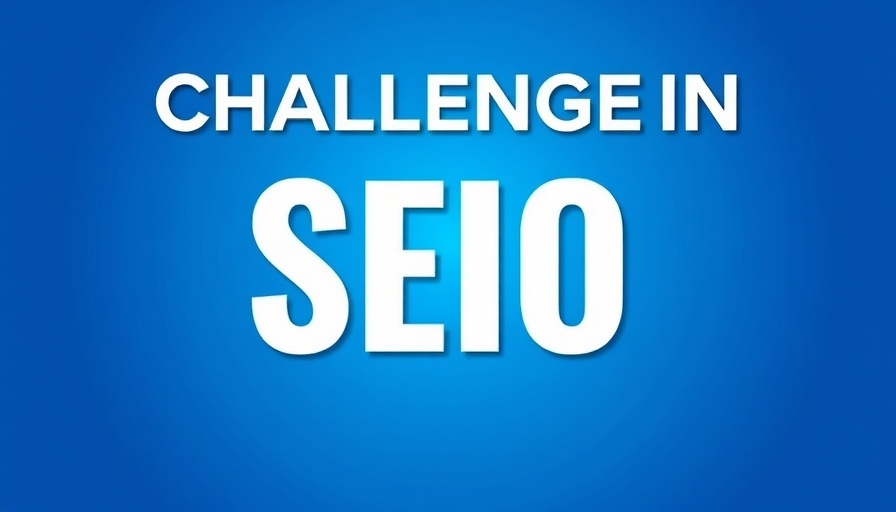
The Paradox of SEO: Still the Best Option Despite Challenges
The world of search engine optimization (SEO) is in turmoil, yet it stands resilient as a pivotal marketing strategy. In recent times, industry insiders report that website traffic sourced from search has plummeted by as much as 40% due to the overwhelming influx of AI-generated content and changes in Google's algorithms. Yet, despite these challenges, SEO remains a powerhouse for businesses. This duality of harsh reality and ongoing opportunity forms the crux of much discourse within online marketing communities.
Why SEO Endures Amidst Challenges
Historically, SEO has been an exceptionally profitable channel. Its appeal lies in the ability for businesses to build traffic, enhance brand recognition, and achieve conversions through organic search. The innovative aspect of SEO is its longevity—it generally compounds value over time, unlike paid advertising, which requires continuous investment.
Even though numerous challenges arise from the saturated landscape created by generative AI, the fundamentals of SEO continue to support its value. SEO isn’t merely about ranking higher; it’s about understanding user intent and providing genuine value that addresses consumer needs.
Shifts Triggered by Generative AI
We are witnessing a rapid transformation in how SEO functions, heavily influenced by AI capabilities. With AI technology facilitating the creation of high volumes of content, websites are brimming with mediocre articles designed to target keywords. This, in turn, leads to a dilution of unique and valuable content that once thrived in the SEO ecosystem. Marketers now face a unique dilemma: how to stand out amidst a sea of AI-generated information.
While AI can enhance productivity and offer immense speed in content creation, it often fails to capture emotional relevance and storytelling depth—the elements that inevitably connect with consumers. Human ingenuity, in which authentic narratives and relatable insights shine, remains unmatched. Balancing the utility of AI with the essence of human creativity is essential for future success in SEO.
The Future Landscape of SEO
The landscape of SEO is undoubtedly evolving. As human-vetted content maintains its value, embracing AI's practical applications can complement human effort in creating meaningful content. Automated insights, keyword research enhancements, and on-page optimization can drive efficiency, but striking a balance with human oversight will be crucial to foster authentic connections with consumers.
Interestingly, Google's continuing algorithm updates suggest an inclination toward favoring genuine, user-centric content over keyword-stuffed articles. Marketers must, therefore, adapt their strategies to meet these evolving expectations while avoiding the pitfalls of quick-fix solutions that AI can pose.
Tools and Techniques for Effective SEO
To navigate the tumultuous waters of modern SEO, tools emerge as lifesavers. Utilizing AI tools like SurferSEO and Clearscope can aid marketers in crafting high-quality SEO content. Additionally, plagiarism checkers ensure originality, while analytics tools provide insights into user behavior that help shape content strategies. Crafting a deliberate content strategy that harmonizes the speed and efficiency of AI with the need for originality and emotional engagement will set companies apart in this competitive arena.
The Emotional Connection and Human Touch
In what seems like a world driven by machinery, emotional connectivity becomes paramount. The ability of a well-placed heartfelt story or relatable insight to resonate with audiences cannot be overstated. As an online marketer, weaving personal stories or industry insights into your content offers more than just information; it provides context that machine-generated content often lacks.
People have an inherent tendency to connect with narratives. Data-driven insights can fuel a marketer's strategy, but enriching those insights with personal touches will cultivate deeper brand loyalty amongst consumers.
Conclusion: Adapt, Evolve, and Thrive with SEO
Although the challenges facing SEO are significant, they provoke innovation amongst marketers. The key to leveraging SEO as the best marketing channel lies in acknowledging and addressing these shifts, while prioritizing quality, authenticity, and user experience. For businesses to remain competitive amidst the growing AI influence, it’s imperative to blend innovative technology with human storytelling, thus crafting content that resonates and connects with audiences on a deeper level.
So, whether you’re a small business owner or leading an expansive marketing team, **it’s time to embrace the evolution of SEO. Forge your path, and leverage the tools at your disposal to shape your brand's narrative in the ever-changing landscape of digital marketing**. By augmenting your strategies with thoughtful content that meets consumer needs, you’ll not only survive but thrive in the age of AI-driven SEO.
 Add Row
Add Row  Add
Add 




 Add Row
Add Row  Add
Add 

Write A Comment